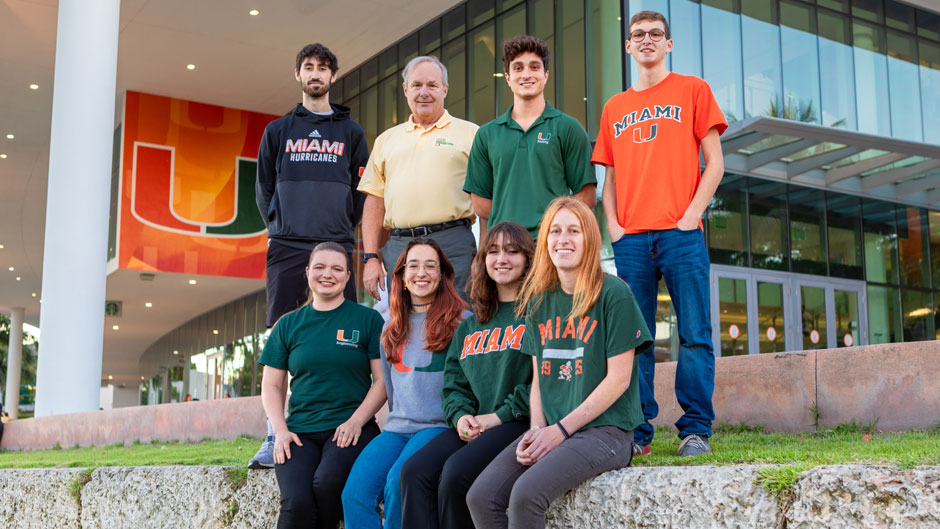Students win $100,000 prize from Elon Musk’s carbon-removal competition
Jenny Hudak, 11-10-2021

Last spring, as Laura Stieghorst watched Elon Musk’s SpaceX rocket blast off from Cape Canaveral, the University of Miami undergraduate wished the billionaire would pour as much money into saving the planet from climate change as he was enabling people to leave it.
Just a few days later, Stieghorst was delighted to learn that the Musk Foundation had launched the $100 million XPRIZE Carbon Removal project, a global contest aimed at generating ideas for extracting and sequestering carbon dioxide from the atmosphere or ocean—and the prizes included a total of $5 million for ideas from students.
Stieghorst immediately got to work. She spent her summer researching various methods for ocean-based carbon removal and was intrigued by those that would increase the alkalinity of the water and neutralize the acidification that, along with warming waters, is imperiling coral reefs and other marine ecosystems. She connected with Greg Rau, a renowned carbon cycle expert who patented such a process, and recruited a team of students and faculty members from five schools across the University. They spent seven intense weeks developing a proposal for the XPRIZE.
On Wednesday, Stieghorst and her Accelerated Carbonate Ion Dissolution and Dispersal (ACIDD) student team members—Isabella Arosemena, Zach Berkowitz, Jeanette Betke, Isabelle Fitzpatrick, Anwar Khan, Eden Leder, Nancy Lewis, and Drew Rich—learned their work had paid off. XPRIZE announced that ACIDD is one of five student projects awarded $100,000 to advance Musk’s goal of removing 1 billion tons of CO₂ per year from the atmosphere.
Now, Stieghorst, who is graduating in December with a degree in ecosystems science and policy, acknowledges that the hard work really begins. “I am over the moon,” she said. “I had so much confidence in the solution that I imagined this happening. But everything we did was theoretical. So, now we have to prove the idea works in the real world and at scale.”
The ACIDD proposal was based on a process developed by Rau, the chief technology officer and co-founder of Planetary Hydrogen, a carbon-capture startup. The process generates a low-carbon form of alkalinity using waste products from mining, water, and renewable electricity, and harvesting valuable byproducts such as hydrogen—a key ingredient to a decarbonized energy system. When added to the ocean, the alkalinity enhances the ocean’s uptake of CO₂ from the air while countering local ocean acidification.
“Essentially, it’s like one big Alka Seltzer,” Stieghorst said. “When the tablet dissolves in water, it can neutralize acid. Distributing this liquid in the ocean will have a similar effect—and speed up a natural part of the geologic carbon cycle that takes thousands of years. Accelerating it to human-time scales can safely lock away our anthropogenic carbon emissions for more than 100,000 years.”
Working with Planetary Hydrogen, the ACIDD team will assess the environmental impact of the process by measuring its effects on laboratory corals.
The team’s faculty advisors, Chris Langdon, a professor at the Rosenstiel School of Marine and Atmospheric Science who was instrumental in connecting Stieghorst to Planetary Hydrogen, and Esber Andiroglu, associate professor of practice in the Department of Civil, Architectural, and Environmental Engineering, guided the students through the XPRIZE proposal, with Planetary Hydrogen’s support. Now, with the ACIDD team’s prize in hand, both teams plan to work together to advance their common goal of unlocking the power of the oceans to address the climate crisis—and win the grand XPRIZE in 2025.
“Laura and her team are an inspiration to all those who are working to advance climate solutions,” said Jason Vallis, Planetary Hydrogen’s vice president for external relations. “We were extremely impressed with her leadership in getting this project off the ground and are thrilled to learn of the team’s success in the student XPRIZE competition. We look forward to working together to bring ocean carbon dioxide removal to the forefront.”
The partnership is one that Langdon, who studies the biology and ecology of corals, said could expand important research in the future. “Corals are a super delicate organism,” he said. “If we can show that we can add the Planetary Hydrogen product to the water and it doesn’t injure the health of the corals—or even enhances their health—that could go a long way in convincing people that a larger-scale experiment would be safe to try.”
For her part, Stieghorst looks forward to the day that the ACIDD team’s job is building a market for and social acceptance of ocean-based carbon dioxide removal technologies. “CO2 is invisible. Alkalinity is complicated,” she said. “If we’re creating a solution that is, hopefully, going to be global one day, you need a lot of public support.”
To learn more about the ACIDD project, email Laura Stieghorst at lxs962@miami.edu or visit the team’s Instagram or Twitter pages.